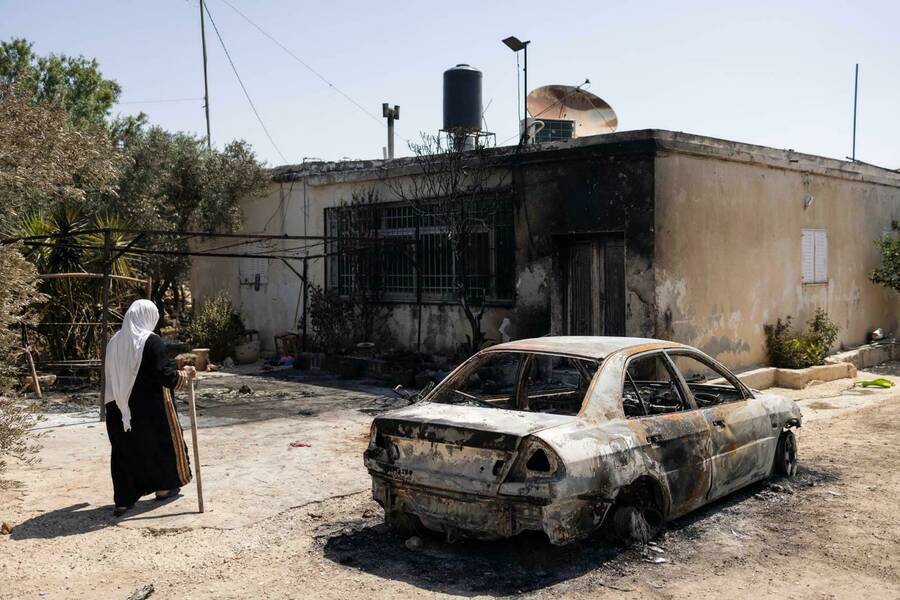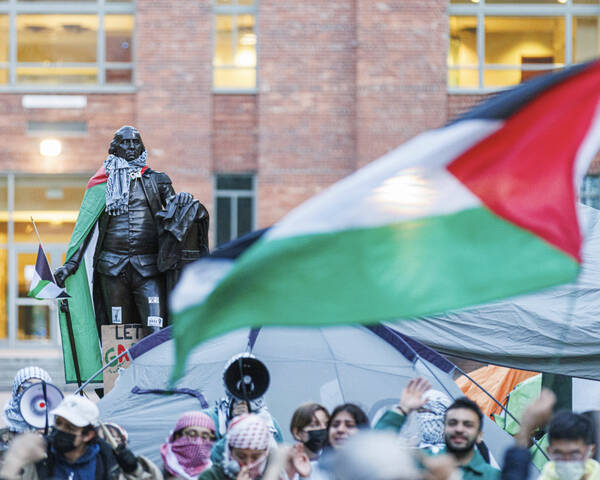Under a Settler Government, Violence Grows
Haaretz’s West Bank correspondent Hagar Shezaf discusses why settler attacks on Palestinians are becoming bolder.

Palestinians inspect the damage caused by an attack of 200 settlers in the West Bank town of Turmus Ayya on June 21st.
(This article previously appeared in the Jewish Currents email newsletter; subscribe here!)
On June 20th, Palestinian gunmen killed four Israeli settlers at a roadside restaurant near the West Bank settlement of Eli. The next day, hundreds of settlers responded by rampaging through the Palestinian town of Turmus Ayya, shooting live ammunition at residents and setting fire to at least 30 homes and 60 cars. According to witnesses, Israeli soldiers only arrived at the end of the hours-long attack, at which point they escorted settlers out of the town. One Palestinian was killed during the assault, though it is unclear whether an Israeli soldier or a settler was responsible.
Turmus Ayya bore the brunt of settlers’ outrage, but it was not the only Palestinian municipality that was attacked in retaliation for the killing of Israeli settlers last week. On June 20th, settlers burned cars and homes in the village of Al-Lubban ash-Sharqiya. On June 21st, settlers set fire to a school in the village of Urif; they also entered a mosque and seized a copy of the Quran, which they defaced and threw into the street. Yet another group of settlers stormed the village of Umm Safa on June 24th, firing weapons and burning houses and cars.
In the aftermath of these attacks, Israel’s National Security Minister Itamar Ben-Gvir and Finance Minister Bezalel Smotrich said that an Israeli army commander searching for the Umm Safa rioters was engaging in “collective punishment” by checking settlers’ cars. Ben-Gvir separately called for a military operation in the West Bank that would “blow up buildings [and] assassinate terrorists—not one, or two, but dozens, hundreds, or if needed, thousands.”
To understand the roots of this settler violence, Jewish Currents turned to Hagar Shezaf, Haaretz’s West Bank correspondent. I spoke to Shezaf about the scope of the settler rampage in Turmus Ayya, Israeli leaders’ response, and why the political situation in the occupied West Bank is likely to worsen. This conversation has been edited for length and clarity.
Alex Kane: Settler violence is a daily reality throughout the West Bank. How is what happened in Turmus Ayya different?
Hagar Shezaf: Settlers will often go to the nearest junction and throw stones at Palestinians’ cars. That does not require much planning. But in Turmus Ayya, settlers set fire to houses and cars, which means they went in armed with flammable material. So that indicates to me that the Turmus Ayya attack was more premeditated and thus more violent. Overall, settlers are growing less concerned about the possibility of being stopped by law enforcement, and are acting with the knowledge that Israeli society in general is more accepting of their actions.
AK: The attack on Turmus Ayya is one of hundreds of incidents of settler violence that have taken place during the first year of this Netanyahu-led government. Just five months ago, Israeli settlers entered the village of Huwara, where they torched cars and homes with Palestinians still inside. Why are these settler attacks escalating?
HS: The attacks in Huwara and Turmus Ayya were made possible by Israel’s current government, which is a settler government. Sources in the defense establishment have told me that Ben-Gvir and Smotrich are supportive of the attacks. My colleague Yaniv Kubovich’s sources say it is government policy to deny Israel’s armed forces the reinforcements necessary to prevent attacks on Palestinians.
The attack on Turmus Ayya could have been averted if the military, the Shin Bet [Israel’s equivalent of the FBI], and the Border Police weren’t standing down. I’m in a bunch of WhatsApp groups where settlers share times of protests and events, and when a message went out saying there will be a protest following the funeral of a settler killed by a Palestinian gunman, I thought, “Yeah, of course, there’s going to be violence.” I didn’t know the attack would be as extreme as it was, but when you see settlers marching toward a Palestinian town after a funeral, it’s a safe bet that there will be some sort of violence. And yet the Israeli authorities did nothing to anticipate the violence or act against it.
So my takeaway is that the situation was really bad before this, but—surprise—it can get worse under a government that is not just pro-settler, but a settler government.
AK: After Turmus Ayya, the Israeli army issued a statement condemning settler violence, and Netanyahu said, “All citizens of Israel are obligated to obey the law.” What do you make of those statements coming from a security apparatus and government that is allowing settler violence to escalate?
HS: On the one hand, certain statements need to be made for the sake of Israel’s relationship with the United States—even though that relationship has deteriorated. Officials need to say something, even if it means nothing.
On the other hand, the military actually is concerned about settler violence because it makes their work difficult. Even some of my army sources say that the chaos is a bit too much, which is something I’m hearing for the first time in my three years as a West Bank reporter. One source told me that army officials had planned a certain routine military action in the northern West Bank, but they ended up not doing it because they had to deal with settler violence in Urif. Of course, they did not deal with the settler violence very well—they didn’t prevent anything—but I do think there is a feeling among some in the military that things have gotten out of hand.
AK: What steps are Israeli authorities taking to stop settler attacks?
HS: After Huwara, the police arrested 17 settlers suspected of being involved in the attack, but the arrests never led to indictments. Most of the settlers have since been released.
Notably, two of the settlers suspected of attacking Huwara were sent to administrative detention [imprisonment without charge or trial]. It’s very, very rare to see Jews in administrative detention, so much so that after these early March detentions, for a time we had the highest-ever number of Jews in administrative detention—four. [The two other Jews were settlers detained for separate attacks in Huwara and Jerusalem.] But a few months later, the March detainees were let go after members of the Knesset signed a letter calling for their release and Ben-Gvir said “it’s undemocratic to arrest a person and then throw him in jail without evidence or a trial.”
AK: How do these attacks fit into the broader settler project of territorial expansion?
HS: I recently interviewed residents of Ein Samiya, a very small Palestinian village near the settlement of Kochav Hashahar. There are a number of very violent outposts [settlements built without explicit government authorization] in the area. As a result, the villagers said, “We are leaving because we can no longer tolerate the settler attacks here.” The day they left, settler WhatsApp groups were celebrating, which showed this violent settler attack had the aim of ethnic cleansing.
In Turmus Ayya, a private Palestinian company has been building houses for several years, but the project has been vandalized again and again, and the company has lost money and clients. The explicit goal of the attacks—which you can see in settlers’ tweets about it—is to prevent the construction of these Palestinian houses. Violence is the tool they are using to achieve that goal.
AK: Settlers are even able to leverage Palestinian militancy to grow their power. After the Palestinian attack near the settlement of Eli, seven more outposts were erected throughout the West Bank, more settlements were authorized in Eli, and settlers illegally returned to the outpost Evyatar, which the government removed them from in 2021. What’s the relationship between Palestinian violence and these developments?
HS: Many settlers want to find every opportunity to advance their aim of settling the entire West Bank. So the moment there is a political excuse, they use it. After the Palestinian gunmen killed settlers near Eli, Israel’s settler government quickly advanced an extra 1,000 housing units in Eli. The plan had been contemplated before, but they took this shooting as the opportunity to advance it.
AK: How do you think these dynamics will continue to play out in the West Bank?
HS: I don’t like prophecies, and I don’t know exactly where things are headed, but I do know a few things. First, Palestinian attacks on Israelis and settlers have become more deadly than before, simply because more weapons are being smuggled into the West Bank. There’s also a lot of theft and trade of Israeli army weapons, and you can now order materials online to construct a gun at home. So with these weapons and with the weakening of the Palestinian Authority, which used to arrest Palestinian militants, I think violence will continue to grow.
Secondly, within the Israeli political sphere—which has become more and more radical—there is a push toward a bigger military campaign in the northern West Bank, which would lead to even more killings of civilians. We’re already seeing tactics that prefigure such an escalation. A few days ago, the Israeli military used a drone to kill three Palestinian gunmen who were in their car, which is something that hasn’t happened in the West Bank since 2006. Such drone attacks are typically seen in Gaza, and Israeli policy has been to create different conditions in the two places, but recently, the lines between Israel’s treatment of Gaza and the West Bank are blurring.
When the news of the drone strike broke, Ben-Gvir and other ministers called the action a good start. All of this leads me to suspect that the situation will keep on spiraling. I don’t see a lot of good in the future.

